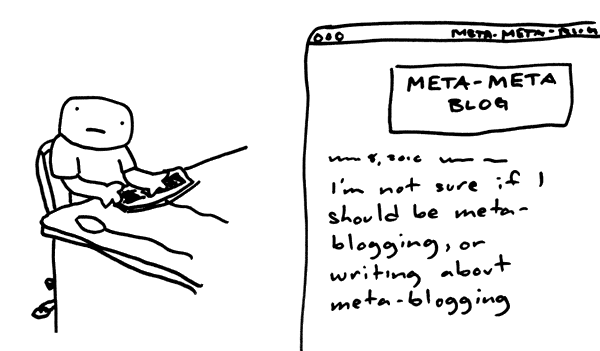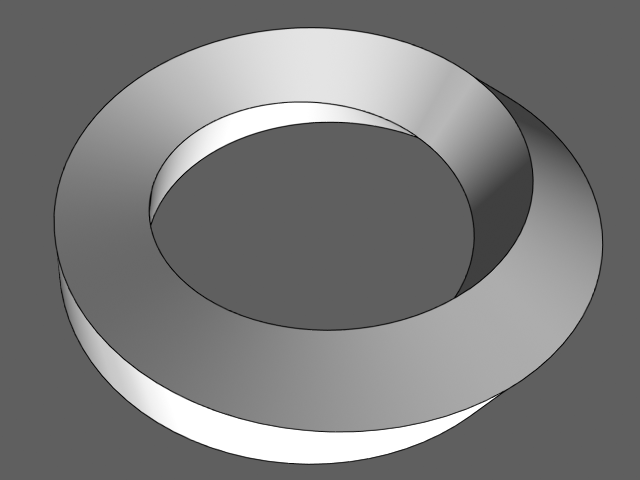In between the soul-crushing self-esteem issues (thanks, puberty) and growing out my hair, then cutting it off, then growing it out again, my memories of middle school are very few and extremely far between. It was a time full of discomfort, exhilaration, and weird body odors that I have deliberately erased from my mental hard drive to make room for other, better-smelling memories. I recommend this. There is one memory, though, that managed to survive the purge: I am in Ms. Wagner’s 6th grade science class and a strip of paper about one inch wide and one foot long sits in front of each of us. We are to create a Möbius Strip. We are to study it. We are to marvel at this tiny infinity, this microcosmic paradox. Look at the way you can never trace one side fully without colliding into the other. Look at how it folds in on and refers back to itself, forever and ever.
Though I’m positive this wasn’t her teaching objective, I’d like to take this opportunity to formally thank Ms. Wagner for introducing me to one of my favorite things: meta. You’ve heard this word before: metatarsal, Metacritic, Metta World Peace, metaphor, metadata. “Meta” is a Greek prefix that means “after,” “beyond,” or “along with.” It was meant to attach to other words, but we in the 21st century are language pioneers and we are not to be denied. We have orphaned it, segregating it from its various suffices, and reverse-engineered it to fit our needs. Nowadays, “meta”—a proud single adjective that doesn’t take shit from anybody—is usually used to describe a creative work that “consciously references or comments upon its own subject or features.” Something that is meta is something that is so self-aware it has self-awareness about its self-awareness. Something that is meta has #levels and slyly or sometimes even blatantly winks at you, the savvy witness. Something that is meta folds in on and refers back to itself, forever and ever.
Take Ernest Baker, a freelance Internet writer whose profile of Drake a couple weeks ago was, as my brother put it, “hella official.” This week, Jonah Weiner dropped this critique of Baker’s piece and, if I’m being totally honest, my brain almost short-circuited from meta overload. Baker’s original piece, cleverly titled “Drake In Real Life,” already smacked of self-reference and solipsism in relation to Baker, Drake, and Baker and Drake together. Weiner questions this style choice and Baker’s tendency towards first-person journalism; he wonders if both the original piece as well as Baker’s voice are too subjective, too autobiographical, too I-message-y.
Do you see all the metalevels here? Baker writes a meta piece with a meta title on Drake—a rapper who is pretty meta himself, what with his prayer hands emoji tattoo and all—and then Weiner writes a critique of said piece essentially calling it out for being too meta. And this is all AFTER I screenshot one of Baker’s grams from this week, aptly captioned “because the internet:”
And then, in what the French would call the “pièce de résistance” or what I would call the “motherfucking cherry on top,” we have the stunningly prescient comment from @jonastheprince of “So meta.”
I mean.
I had a platoon of examples from pop culture to convey my love of meta i.e., the metanarrative on The Good Wife, the hysterical metacommentary on Jane the Virgin via the narrator and the onscreen text, or that time Taylor won the Meta Olympics and the Internet. I can’t even bring myself to yammer at you about them though because I am currently crushed under the weight of too many self-references. There I am: lost somewhere on that Möbius Strip from my sixth grade science class, folding in on and referring back to myself, forever and ever.



Hella good piece chica.
Now I know what meta is ….. I love you can swear as only a female Oreck/Shaw can— with STYLE.
Like.